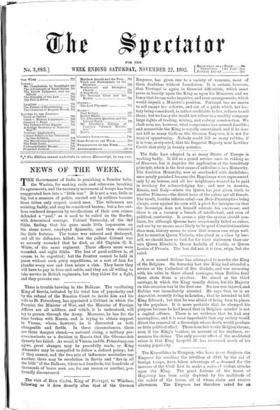The Salle Law adopted in so many States of Europe
is working badly. It did us a grand service once in ridding us of Hanover, but it impedes the application of the hereditary principle, which is the first cause of orderliness in a Monarchy. The Austrian Monarchy, now so overloaded with Archdukes, once nearly perished because the Hapsburgs were represented only by an heiress, and all her neighbours wanted to be paid in territory for acknowledging her; and now in Austria, Russia, and Italy—where the Queen has just given birth to another Princess—the direct heirs of the rulers are all female. The result, besides infinite cabal—an Heir-Presumptive being always, even against his own will, a pivot for intrigue—is that the Sovereign does not himself educate his successor, and there is on a vacancy a breach of intellectual, and even of political, continuity. It seems a pity the system should con- tinue, for although Queens have occasionally failed as rulers, and are by no means more likely to be good Constitutionalists than men, history seems to show that women can reign well. Not to mention Queen Victoria, who stood in a class by her- self, we should have to look far for wiser statesmen than our own Queen Elizabeth, Queen Isabella of Castile, or Queen Louise of Prussia. The last did not, it is true, reign, but she ruled.










































